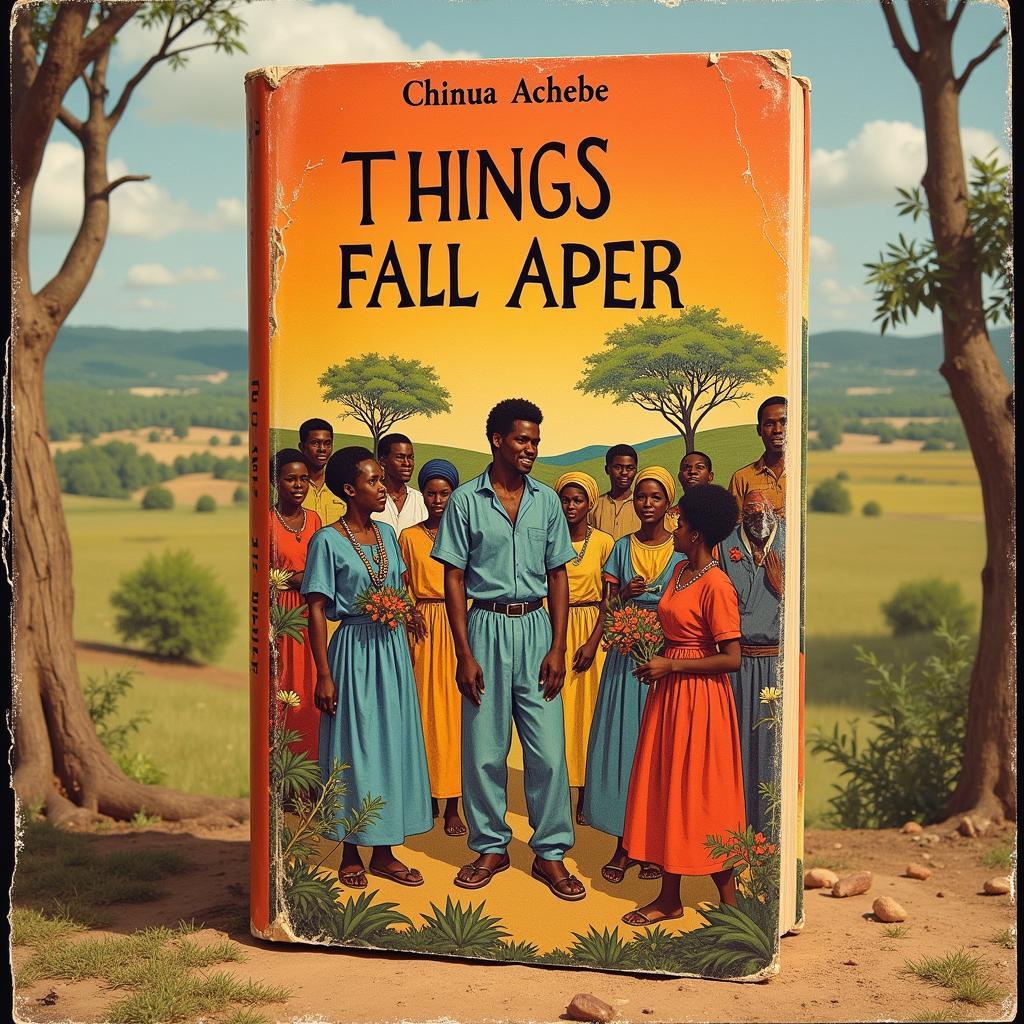Exploring the Rich Tapestry of African English Literature Writers
African English Literature Writers have carved a unique space in the global literary landscape, offering powerful narratives that reflect the diverse experiences, histories, and cultures of the African continent. From the poignant poetry of Chinua Achebe to the vibrant prose of Chimamanda Ngozi Adichie, these writers have given voice to a multitude of perspectives, challenging stereotypes and enriching our understanding of the world. Their works explore themes of colonialism, identity, post-colonial struggles, and the complexities of human relationships, offering profound insights into the African experience.
 Chinua Achebe's Things Fall Apart cover
Chinua Achebe's Things Fall Apart cover
Pioneering Voices: Early African English Literature Writers
The emergence of African English literature can be traced back to the early 20th century, a period marked by the rise of nationalist movements and the burgeoning desire for self-expression. Early writers like Amos Tutuola, with his mythical tales rooted in Yoruba folklore, paved the way for subsequent generations. Cyprian Ekwensi captured the vibrancy of urban life in West Africa, while Chinua Achebe’s Things Fall Apart became a landmark work, exposing the devastating impact of colonialism on traditional Igbo society. These writers laid the foundation for a literary tradition that would continue to evolve and flourish.
african diasporic writers in english literature
What makes these early works so compelling is their ability to bridge the gap between oral traditions and written literature. They often incorporate elements of storytelling, proverbs, and folklore, creating a rich tapestry of language and imagery.
The Post-Colonial Landscape: Shaping New Narratives
The post-colonial era saw a surge in African English literature writers, each grappling with the complexities of independence and the challenges of nation-building. Ngugi wa Thiong’o, a Kenyan writer and playwright, advocated for writing in African languages, arguing that English was a tool of colonial oppression. Wole Soyinka, the first African Nobel laureate in Literature, explored themes of political corruption and social injustice through his plays and poems. These writers challenged the dominant narratives and offered new perspectives on the African experience.
 Wole Soyinka's Death and the King's Horseman cover
Wole Soyinka's Death and the King's Horseman cover
Who are some prominent female African English literature writers?
Female voices have played a crucial role in shaping African English literature, offering nuanced perspectives on gender, identity, and societal expectations. Writers like Buchi Emecheta, Ama Ata Aidoo, and Bessie Head explored the complexities of women’s lives in patriarchal societies, challenging traditional norms and giving voice to marginalized experiences. Their works offer powerful insights into the struggles and triumphs of African women.
african american literature essay questions
The Contemporary Scene: A Global Voice
Contemporary African English literature writers continue to push boundaries, exploring new themes and experimenting with different forms of expression. Chimamanda Ngozi Adichie, with her captivating novels and TED talks, has become a global literary icon. NoViolet Bulawayo’s We Need New Names offers a poignant portrayal of the immigrant experience. These writers engage with contemporary issues such as globalization, migration, and the ongoing legacy of colonialism, while also celebrating the resilience and creativity of African cultures.
african american literature ii syllabus
What are some common themes in contemporary African English literature?
Common themes include identity, diaspora, the impact of globalization, and the search for belonging in a rapidly changing world. Many contemporary writers also explore themes of environmental degradation and the challenges posed by climate change.
Dr. Abimbola Adebayo, a renowned scholar of African literature, notes, “Contemporary African writers are not just telling stories; they are shaping global conversations. They are challenging us to rethink our assumptions and to engage with the complexities of the African continent.”
 Chimamanda Ngozi Adichie's Half of a Yellow Sun cover
Chimamanda Ngozi Adichie's Half of a Yellow Sun cover
african diaspora writer in the indian ocean
Conclusion: A Continuing Legacy
African English literature writers have made an indelible mark on the world of letters. Their works offer a powerful lens through which to understand the complexities of the African experience, challenging stereotypes and enriching our understanding of human history and culture. From the pioneering voices of the early 20th century to the vibrant contemporary scene, African English literature continues to evolve, captivating readers and inspiring new generations of writers. These writers are essential voices in the ongoing global dialogue, and their contributions to literature are invaluable.
FAQ:
- What are some key characteristics of African English literature?
- Who are some influential African playwrights writing in English?
- How has colonialism impacted African literature?
- Where can I find resources for studying African literature?
- What are some emerging trends in African writing?
- How does oral tradition influence African English literature?
- What are some recommended anthologies of African literature?
Other articles you might be interested in: African Literature in Translation, The Impact of African Literature on Global Cinema.
Need support? Contact us 24/7: Phone: +255768904061, Email: kaka.mag@gmail.com or visit us at Mbarali DC Mawindi, Kangaga, Tanzania.